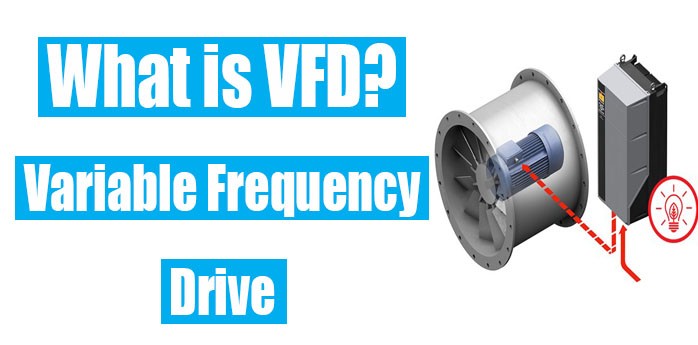Solar VFD Inverters: Revolutionizing the Future of Solar Pumps
The world of renewable energy has seen significant growth, and one of the latest innovations is the Solar VFD inverter, a key technology for solar pumps. Utilizing the power generated from solar panels, a Solar VFD Controller adjusts the speed of electric motors based on the required load. By providing a seamless and reliable alternative to conventional power sources, Solar VFD Inverters play a crucial role in enhancing energy efficiency, especially in water pumping systems and irrigation setups. This technology not only supports renewable energy adoption but also addresses the challenges of inconsistent grid power in remote or off-grid locations. In this blog, we’ll cover everything from what a VFD is, why it’s used in solar pumps, its benefits, and how Servotech’s new VFD Solar Pump inverter is paving the way for efficient water management.
What is VFD?

VFD or Variable Frequency Drive, is a type of motor controller that controls the speed and torque of electric motors by varying the frequency and voltage of the power supply. It enables motor-driven systems to run at optimal speeds, enhancing efficiency and prolonging the lifespan of the equipment.
Why is VFD Used in Solar Pumps?
In solar pump systems, the energy input fluctuates based on sunlight availability. A VFD Controller is used to match the speed of the pump motor with the varying power generated by solar panels. Here’s why VFD is crucial for solar pumps:
1. Efficient Power Utilization: VFD maximizes the use of available solar energy, preventing the motor from overloading or running inefficiently.
2. Adaptability: It adapts to changing solar conditions, ensuring consistent water output throughout the day.
3. Reduced Wear and Tear: By controlling the motor speed, VFD minimizes mechanical stress, extending the lifespan of the pump.
What is a Solar VFD Inverter/Controller?

A Solar VFD (Variable Frequency Drive) Inverter is a device that regulates the speed of the pump motor by adjusting the frequency of the electrical power supply, based on the energy input from the solar panels. This allows for smooth operation even with varying solar conditions.
Benefits of VFD Solar Inverter
Using a VFD Solar Inverter in solar pump systems offers benefits like:
- Enhanced Efficiency: Optimizes motor speed to use power effectively, reducing energy waste.
- Cost-Effective: Lowers electricity bills by harnessing solar energy, minimizing the need for grid power.
- Protection Features: Protects against voltage fluctuations, dry running, and motor overloads.
- Increased Lifespan: Reduces mechanical stress on the motor, prolonging the equipment’s life.
- Eco-Friendly Solution: Promotes sustainable energy use, contributing to a greener environment.
How VFD Solar Inverter Works

A VFD solar inverter works by converting the DC power generated from solar panels into AC power, which is then supplied to the pump motor. The inverter adjusts the frequency of the AC power based on the available sunlight, allowing the pump to run at variable speeds. Here’s a simplified process:
1. Solar Energy Generation: Solar panels collect sunlight and generate DC power.
2. DC to AC Conversion: The VFD Solar Inverter converts this DC power into AC power.
3. Frequency Regulation: The VFD adjusts the frequency and voltage supplied to the motor, matching the pump speed with the available energy.
4. Optimized Pump Operation: The pump operates smoothly at varying speeds, ensuring efficient water flow based on the sunlight intensity.
Difference Between Traditional Pump and Solar Pump
| Feature | Traditional Pump | Solar Pump |
| Power Source | Grid Electricity or Diesel | Solar Panels |
| Running Cost | High | Low (Powered by Solar) |
| Efficiency | Lower Efficiency | Higher Efficiency with VFD |
| Environmental Impact | High Carbon Emissions | Eco-Friendly |
| Operational Range | Fixed Speed Operation | Variable Speed Operation |
| Durability | More Wear and Tear | Longer Lifespan with VFD |
Servotech Launches Advanced VFD Solar Pump Inverter
Servotech Renewable Power System has recently launched its innovative VFD Solar Pump Inverter, designed to provide unmatched efficiency and performance for solar pumping applications. With features like:
Real-Time Performance Monitoring
Adaptive Frequency Control
Protection Degree- IP20/P21
Cooling Method – Air cooling
Max Efficiency of the Machine- 99%
User-Friendly Interface
How to Purchase the Servotech VFD Solar Pump Inverter
Purchasing the Servotech VFD Solar Pump Inverter is simple:
Conclusion
The introduction of Solar VFD Inverters is a game-changer for water management, making solar pumps more efficient and reliable. Servotech’s VFD Solar Pump Inverter combines cutting-edge technology with sustainable practices, offering a powerful solution for agricultural, industrial, and residential applications. Make the switch today and experience the benefits of green energy with Servotech.


